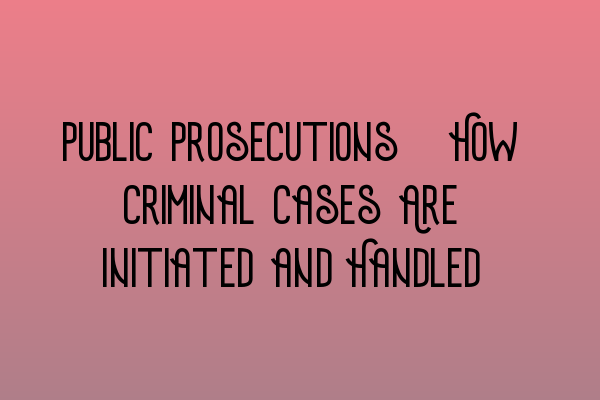Public Prosecutions: How Criminal Cases Are Initiated and Handled
Welcome to the SQE Criminal Law & Practice Law UK blog, where we provide valuable insights into various legal topics. In this blog post, we will delve into the intriguing world of public prosecutions and explore how criminal cases are initiated and handled in the UK.
The Role of the Crown Prosecution Service (CPS)
When it comes to initiating criminal proceedings, the Crown Prosecution Service (CPS) plays a pivotal role. The CPS is responsible for prosecuting cases on behalf of the public and ensuring that justice is served. They work closely with the police, gathering evidence and assessing whether there is enough evidence to proceed with a criminal case.
Once the CPS determines that a case should proceed, they will present the evidence in court and argue the case against the defendant. The CPS has highly skilled prosecutors who are well-versed in criminal law and have a deep understanding of the legal procedures involved.
If you are aspiring to become a criminal lawyer, it is crucial to have a thorough understanding of how public prosecutions work. The SQE 1 Practice Exam Questions and SQE 1 Practice Mocks FLK1 FLK2 articles provide valuable resources to help you prepare for the SQE exams and gain a comprehensive understanding of criminal law and practice.
The Stages of a Criminal Case
Now that we have discussed the role of the CPS in initiating criminal cases, let’s explore the different stages involved in handling a criminal case:
- Investigation: Before a case goes to trial, there is a thorough investigation conducted by the police. This involves gathering evidence, interviewing witnesses, and examining any available forensic materials. The investigation plays a crucial role in building a strong case.
- Charging: Once the investigation is complete and there is sufficient evidence, the CPS decides whether to charge the suspect. If the decision is made to proceed, the suspect is formally charged with the relevant criminal offenses.
- Initial Hearing: After being charged, the suspect appears before a magistrates’ court for an initial hearing. The purpose of this hearing is to determine bail conditions, set a date for the trial, and ensure that the defendant understands the charges against them.
- Pre-Trial Proceedings: In the lead-up to the trial, there may be several pre-trial proceedings, including case management hearings, plea hearings, and the disclosure of evidence.
- Trial: The trial is where the prosecution presents its case against the defendant. The court hears evidence from both sides, including witnesses, and the defendant has the opportunity to present their defense. The judge or jury then considers the evidence and reaches a verdict.
- Sentencing: If the defendant is found guilty, the court proceeds to sentencing. The judge considers various factors, such as the seriousness of the crime and the defendant’s criminal history, to determine the appropriate punishment.
- Appeals: In some cases, the defendant or the prosecution may choose to appeal the court’s decision. This involves a review of the case by a higher court, which may result in the conviction being overturned or the sentence being modified.
To excel in your legal career, it is essential to have a strong foundation in criminal law and practice. The SQE 2 Preparation Courses and SQE 1 Preparation Courses articles offer comprehensive study materials and resources to help you successfully navigate the SQE exams and gain the necessary knowledge and skills.
As the UK legal system continues to evolve, it is crucial for aspiring lawyers to stay up-to-date with the latest developments. The SRA SQE Exam Dates article provides important information about the upcoming exam dates, enabling you to plan your study schedule accordingly.
We hope this blog post has shed some light on the fascinating world of public prosecutions and how criminal cases are initiated and handled. If you have any questions or would like to learn more about this topic, please feel free to contact us. Stay tuned for more engaging and informative blog posts from SQE Criminal Law & Practice Law UK!
